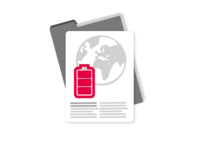Mandatory for almost every product: According to the GPSR, producers must draw up technical documentation for the products they place on the market. The technical documentation must be based on an internal risk analysis.
Since 16 July 2021, it is against the law to sell products with CE marking without a Responsible Person in the EU. In addition, a Responsible Person must also be specified in accordance with the General Product Safety Regulation (EU) 2023/988.

Find out which obligations the EU Batteries Regulation places on you and how to deal with them in your specific case. Receive comprehensive information on how to implement your obligations with regard to labelling, battery passport, EPR and due diligence obligations in the supply chain.